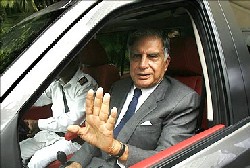The Supreme Court on Friday said it will hold final hearing on a day-to-day basis from April 19 on Tata Group Chairman Ratan Tata's plea to bar online portals and electronic media from airing his phone conversation with corporate lobbyist Niira Radia tapped by the Income Tax Department. A bench of justices G S Singhvi and A K Ganguly will examine the issues raised by Tata including the questions of right to privacy and right to freedom of speech and expression as envisaged under the Constitution.
A bench of justices G S Singhvi and A K Ganguly will examine the issues raised by Tata including the questions of right to privacy and right to freedom of speech and expression as envisaged under the Constitution.
The court had on December 2 last issued notices to the Centre and news magazines, 'Open' and 'Outlook', which had published some portions of the transcripts of Radia's conversation with several people including Tata.
The bench had also issued notices to Union Home Secretary G K Pillai, the CBI, the Income Tax Department and the Finance Ministry asking them to file affidavits on the issue.
All of them had responded to the notices.
Tata, in his petition, has said that several parts of the conversation were purely private in nature which were spoken casually and could not be taken seriously.
Tata has also sought action against those involved in the leaking of the tapes, saying that such an act amounts to the infringement of his Fundamental Right to Life, which includes his right to privacy under Article 21 of the Constitution.
He has contended that Radia's phone was tapped for a probe into alleged tax evasion and it could not be used for any other purpose.
The petition has cited the apex court guidelines in PUCL case in which it was held that the phone surveillance could be done only for a specific purpose.
Tata has argued in the petition that making his conversation with Radia public also violates his another Fundamental Right of Freedom of Speech and Expression under Article 19(1)(a) of the Constitution.
In the wake of spectrum allocation scam which, according to the CAG, resulted in a loss of Rs 1.76 lakh crore to the exchequer, some journals had published the taped conversation that Radia had with various politicians, bureaucrats, industrialists and journalists.
Transcripts of some of these tapes have also been published by various websites, stirring a controversy.







 © 2025
© 2025